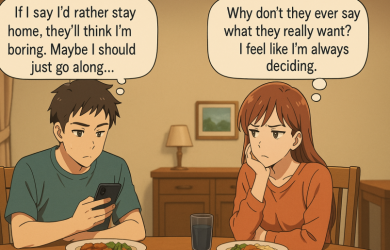How to Deal with a Conflict-Avoidant Partner: 9 Ways

Unlock Daily 30-Sec Tips for a Happier Relationship
👉 Subscribe FREEKey Takeaways
Marriage.com AI Quick Summary
Imagine this: You express a concern to your spouse, hoping for an honest discussion, but instead, they change the subject or say, “It’s fine, let’s not fight about it.”
If your husband avoids conflict or your wife shuts down during disagreements, you may be dealing with a conflict-avoidant partner. At first glance, this approach might seem like a way to maintain peace. However, over time, unresolved issues can create emotional distance and build resentment.
Conflict avoidance isn’t just about sidestepping arguments—it reflects deeper fears or past experiences that shape how one copes with tension.
While it can be frustrating to feel unheard, learning how to support a conflict-avoidant spouse without escalating tension is essential to fostering emotional safety and strengthening your relationship.
What is conflict avoidance in relationships?
Conflict avoidance occurs when a person refuses to admit that they may have a conflict with someone else. Instead of arguing or fighting, they pretend everything is okay to keep the peace.
This may be able to work for a while in a relationship but having a conflict-avoidant partner may cause you to feel like you will be unable to work out your problems. Issues may never seem to get handled because you cannot talk to them.
Grady Shumway, LMHC, says
While conflict avoidance might create temporary peace, it often builds up unresolved issues over time. This can eventually create emotional distance and prevent the relationship from growing through honest communication and problem-solving.
What causes conflict avoidance?
In some cases, conflict avoidance may have been reinforced when a person was growing up. If they said they were unhappy or acted like they had a problem when they were young, they might have been treated unfairly by their parents or caregivers.
Moreover, when an individual has been hurt in relationships when they felt a problem, they may start to act like there are no problems. Instead, they will attempt to act like everything is okay all the time because they want to please the other person.
They may act this way because they simply have a conflict-avoidant personality, or they may have also been diagnosed with conflict avoidance disorder, also known as an avoidant personality disorder. Symptoms include not wanting to be social, being unable to accept criticism, and not taking risks.
If you have a partner with this personality type, you likely wonder how to deal with a conflict-avoidant spouse. The first step is to start learning more about this trait. It can further aid you in determining how to talk to them and work through your problems.
5 reasons people are conflict-avoidant
There are a few reasons someone may be skilled at avoiding conflict in relationships. Here’s a look at the most common reasons to consider. If you note any of these in your relationship, think about reading more about a conflict-avoidant spouse.
1. They have been hurt in the past
An individual may have been hurt in the past, whether when they were growing up or in other relationships, and this has caused them to keep their mouth closed when they have a problem or have a different opinion.
They may also stay quiet even when you ask them for an opinion since they don’t want to cause a bigger fight or upset their mate. You never know how others have acted towards them in the past, so try to be as patient as possible if you have a partner that behaves like this.
2. They think their opinion may cause an argument
Some people may not want to give their opinion because this can cause an argument. Even if you normally get along and don’t have many arguments, they may still go out of their way to avoid upsetting you.
This is okay unless there is something that needs to be worked out. Moreover, this may be when you want to know more about dealing with a conflict-avoidant partner. You may talk to others for more help or consider therapy.
3. They lack confidence
Your partner may have a fear of being disliked. They may need people to accept and like them, which could cause them to be unable to have a conflict with another person.
You likely didn’t cause this, but since you probably don’t want to inflict further damage onto your mate or to your relationship, it may be worthwhile to try to learn more about your partner, so you can understand their point of view even when they may not be very forthcoming with it.
4. They feel like you won’t change your mind
Your partner may feel they will not change your mind when you disagree. In other words, they may feel like their argument is futile. If this is the case, let them have their opinion and you have yours.
Together, you can work out whatever argument you are having, even if it takes longer. This may be valid if your partner keeps their mouth closed because they don’t think you will see their point of view.
Grady Shumway further adds,
Encouraging open dialogue and truly listening to each other’s perspectives can help bridge the gap. When both partners feel heard, it creates space for compromise and mutual understanding, even if agreement takes time.
5. They think they are doing a good thing
Have you ever wanted to keep the peace and not upset someone? This may be what your mate is trying to do when they practice conflict-avoidance in relationships. It could take a lot of talking and getting them to understand that they can say what they feel.
Moreover, it may take you being understanding to them, even when you don’t want to be, especially if they were trying to protect your feelings by not arguing with you about a topic or event.
Certainly! Here are two additional reasons someone may avoid conflict in relationships, each described in about 60 words:
6. They fear escalation
Many individuals avoid conflict because they fear that a discussion could quickly escalate into a larger argument. This fear often stems from witnessing or experiencing intense conflicts in the past, making them reluctant to express their thoughts or feelings.
They may believe that silence is safer than potentially igniting a more serious confrontation, even if it harms the relationship.
7. They lack conflict-resolution skills
Some people may not have developed effective conflict-resolution skills due to their upbringing or previous relationships. They might feel ill-equipped to navigate disagreements constructively, leading to avoidance as a default coping mechanism.
This lack of skills can hinder their ability to articulate their feelings, fostering a cycle of avoidance and unresolved issues that strain the relationship over time.
5 ways conflict avoidance hurts your relationships
While avoiding conflict may not always hurt your relationship, if it keeps happening, some problems can arise. Here’s a look at 5 ways it can.
1. Communication may not feel real
Avoiding conflict may harm your relationship because it may feel like your bond isn’t real. This can be stressful when you can’t talk to your partner about everything and work out differences or talk about your differing opinions.
A 2021 study points out that communication is a top issue for couples and can make them feel unsatisfied. This is why it is so important to be able to communicate with each other, even if you have to learn how to do so.
2. It could cause you to question the relationship
Another way that avoidance can negatively affect your relationship is because it may have you questioning your relationship. Once you notice that your partner doesn’t express their opinion or argue with you, it could make you feel like you don’t know them or that they have been lying about many things.
Of course, you shouldn’t rush to this conclusion. It is important to talk to your mate about this if you feel this way. They may be able to reassure you about how they feel about you and why they don’t wish to argue.
3. Trust may be lost
Questioning whether your relationship is based on lies or that you don’t know how they really feel about things could cause you to lose trust in them. Again, it would help if you tried not to make big decisions when you feel this way since it may not be fair to your spouse.
Even if they try not to argue with you, this doesn’t mean they are lying. While it may be challenging when faced with how to deal with someone who avoids conflict, it is possible, so consider all the things you know about your partner and keep learning more.
4. The same argument may keep coming up
Anytime you cannot work through an issue weighing on your relationship, this can become a problem. Having a spouse who avoids confrontation can cause you to be unable to hash things out and compromise.
This could also cause you to become upset and feel like you have to make all the decisions sometimes. You might think your relationship isn’t as good as you would like it to be.
5. Frustration may be common
Avoiding conflict all the time can leave you frustrated. Sometimes a couple needs to be able to disagree to work through an issue and solve the problem together. When you can’t do this with your mate, it may leave you feeling like things are unfair.
Consider that not all arguments are needed; however, this is also a good thing in some regards. When you aren’t arguing with one another, it may be harder to be mad at each other.
Of course, disagreements may be necessary, and when you can’t have these, you may feel like you are incompatible with your mate. However, there are ways that you can learn more about how to deal with conflict-avoidant personality, so hang in there.
How to deal with a conflict-avoidant partner: 9 ways
Anytime you try your best to learn how to deal with a conflict-avoidant spouse, understand that there are solutions. Here are a few to think about in your life.
1. Consider how you are acting
You may need to think about how you are acting. If you are often standoffish or hard to communicate with when you get upset about something, you may need to change this behavior first before you try to change your mate.
This doesn’t mean that you are wrong, but it may be one of the reasons why your spouse is unwilling to argue with you. If they are sure they will lose or be ridiculed during arguments, they may feel there is no reason to fight with you.
- Try doing this: Reflect on your communication style. After a disagreement, take a moment to journal about your feelings and behaviors to identify areas for improvement.
2. Don’t expect change overnight
In learning how to deal with a conflict-avoidant spouse, you shouldn’t get your hopes up too high that change will happen quickly. After all, your partner may have been avoiding conflict for most of their life, so it can be difficult to change how they feel right away.
However, they can start opening up to you and expressing themselves, so give them time to do so.
- Try doing this: Set a timeline for gradual progress, such as discussing one small issue each week, to help manage expectations.
3. Be grateful when changes happen
Once you do start seeing changes, you should celebrate them. Tell your spouse that you have noticed their hard work and that you are proud of them. This may be exactly what they need to hear to know that you aren’t like others in their past.
Moreover, it may offer them the boost of confidence that they need to keep going.
- Try doing this: Create a “celebration” habit where you acknowledge and express gratitude for any effort your partner makes, no matter how small.
4. Let them talk to you
When dealing with a conflict-avoidant spouse, it is also important to let them talk to you. Don’t try to force them to say things or express themselves when they are not ready.
Practicing mindfulness while working on communication may help improve the amount of support you can give your partner.
- Try doing this: Schedule regular check-ins, inviting your partner to share their thoughts on any topic they feel comfortable discussing, without pressure.
5. Consider therapy
It would help if you also considered therapy when trying to learn more about how to deal with a conflict avoidant spouse. This can be in the form of individual or couples counseling, either of which may help you learn all you need to know about communicating with your partner.
On the other hand, it may be helpful for your partner to reach out for mental health support if they feel like they want to. This could help them address past trauma.
- Try doing this: Research local therapists or online counseling options and suggest scheduling an initial consultation together to explore the benefits.
6. Choose the right time to talk
Timing can significantly impact how a conflict-avoidant partner responds to discussions.
Avoid bringing up sensitive topics when they’re busy, stressed, or distracted. Instead, find a calm, relaxed moment to broach these subjects. This can create a more conducive atmosphere for open communication and help them feel more comfortable expressing their thoughts and feelings.
- Try doing this: Identify a calm time of day when both of you are relaxed, and propose discussing important topics during this window.
7. Use “I” statements
When discussing your feelings, frame your thoughts using “I” statements to minimize defensiveness.
For example, say “I feel hurt when we don’t discuss our issues” instead of “You never want to talk about our problems.” This approach shifts the focus from blame to expressing personal feelings, making it easier for your partner to engage without feeling attacked.
- Try doing this: Practice framing your feelings using “I” statements in everyday conversations, so it becomes a natural part of your communication.
8. Foster a safe space
Create an environment where your partner feels safe to share their thoughts without fear of judgment or negative repercussions. Reassure them that their feelings are valid and that disagreements can occur without damaging the relationship. Establishing this emotional safety can encourage them to open up gradually.
- Try doing this: Establish a “no judgment” rule during discussions, reminding each other that all feelings are valid and deserve respect.
9. Practice patience and compassion
Dealing with a conflict-avoidant partner requires patience. Acknowledge that change may be slow, and remind yourself that their avoidance may stem from fear or past experiences. Show compassion by validating their feelings and experiences, which can help build trust and encourage them to communicate more freely over time.
- Try doing this: Keep a “patience journal” where you note instances where you practiced compassion, reinforcing a positive mindset toward your partner’s progress.
To learn more about why patience is a superpower, watch this video:
Is avoiding conflict a weakness?
While avoiding conflict can seem like an easy way to keep the peace in the short term, it can be a weakness in the long run.
Unresolved issues can fester and grow, potentially leading to resentment and damaged relationships. Avoiding conflict can also prevent personal growth and the development of valuable communication and problem-solving skills.
It’s important to learn how to address conflict constructively, allowing for open communication, mutual understanding, and stronger relationships.
Summing up
If you’re married to a conflict-avoidant spouse, start today by creating a safe space for open dialogue. Avoiding conflict only pushes unresolved issues further beneath the surface, leading to emotional distance and resentment.
Use small, consistent efforts like validating their feelings and practicing active listening. Introduce new ways to communicate by sharing avoiding-conflict examples you’ve noticed and gently encouraging healthier habits.
Change takes time, but every conversation that addresses emotions instead of evading them builds trust.
If these strategies don’t make progress, consider couples therapy to break deep-rooted patterns. By working together with empathy and patience, you can foster a relationship where both partners feel comfortable addressing challenges—strengthening your bond and ensuring long-term emotional intimacy.
 Tips
Tips
Write your tip or submit a video tip
All tips are reviewed before the publishing.
Share this article on
Want to have a happier, healthier marriage?
If you feel disconnected or frustrated about the state of your marriage but want to avoid separation and/or divorce, the marriage.com course meant for married couples is an excellent resource to help you overcome the most challenging aspects of being married.
Recent Articles
Related Quizzes
Unlock Daily 30-Sec Tips for a Happier, Healthier Relationship
👉 Subscribe FREE on YouTube We'd love your feedback!
We'd love your feedback!
 Expert Q&A
Expert Q&A
Ask your question related to this topic & get the support you deserve from experts.





















 Thanks for your feedback!
Thanks for your feedback!